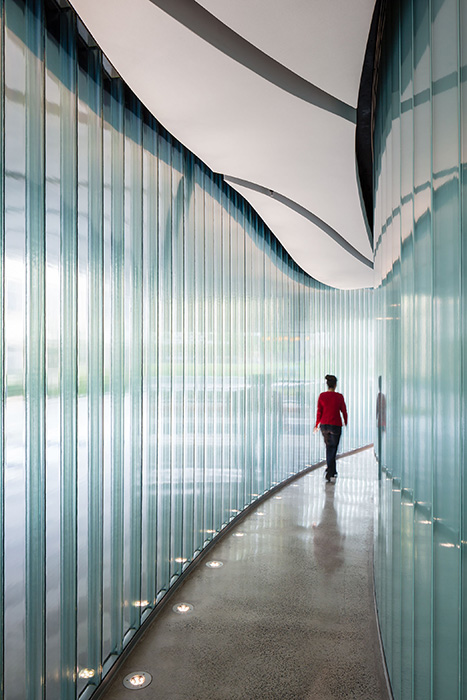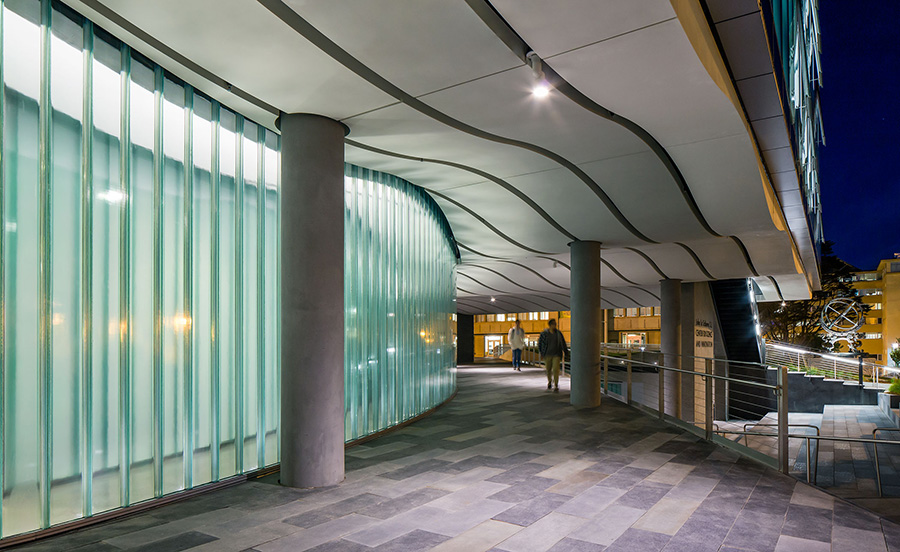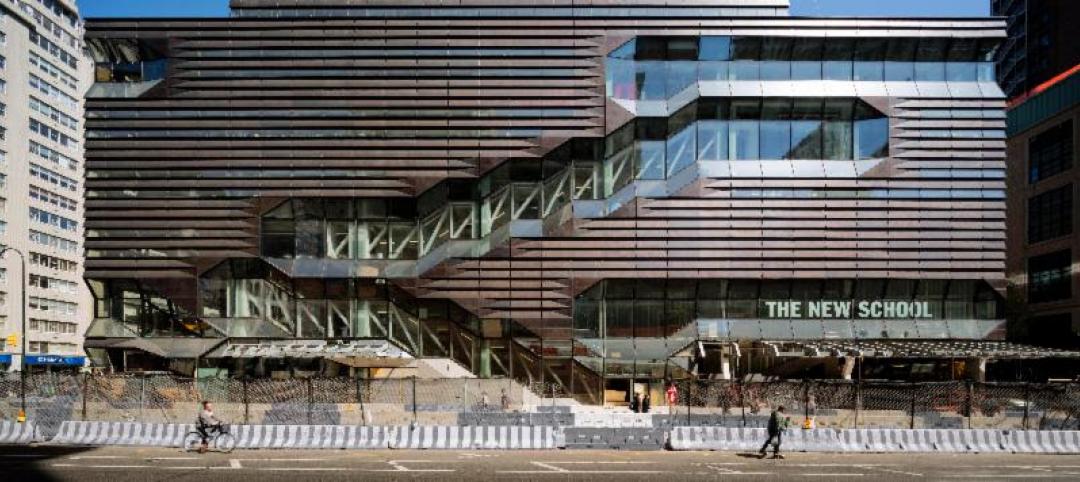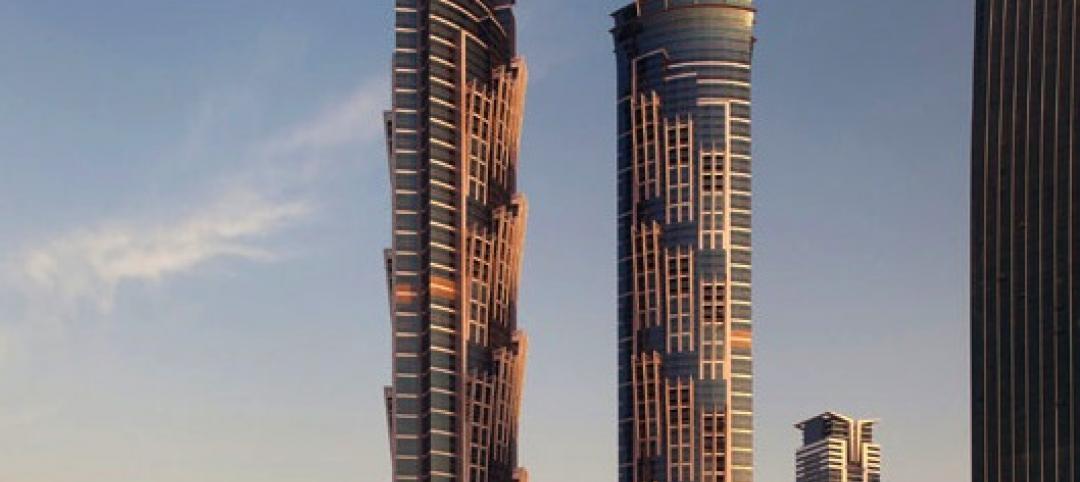Project: University of San Francisco, John Lo Schiavo, S.J. Center for Science and Innovation
Location: San Francisco
Architect: NBBJ
Glass: Pilkington Profilit™ translucent channel glass system with Lumira® aerogel insulation
Glass Supplier: Technical Glass Products
The University of San Francisco’s new John Lo Schiavo Center for Science and Innovation (CSI) brings science to the forefront of academic life. Its glossy, three-story exterior invites students into the facility, and then flows sleekly down into the hillside where below-grade laboratories and classrooms make efficient use of space on the landlocked campus.
For NBBJ architects, the inspiration for the new building came from the faculty’s desire to bring passion to the study of science within the USF academic curriculum. “A key driver behind the CSI was to put science on display and create buzz within the student body,” says Lilian Asperin-Clyman, principal at NBBJ.
To meet functional demands and generate the desired interest in the science facility, the design team looked to high-performance materials. A curtain wall with fritted glass and flexible shades provides students with views to informal learning areas and outdoor spaces to encourage scientific discovery.
Skylights and glazed teaching walls with a writable surface and visual connectivity help bathe lower, “garden level” education areas in sunlight to blur the boundary between above- and below-grade. Sloped walkways promote seamless circulation between the building’s main campus and garden-level spaces.

Glazed channel glass corridor uses borrowed light. Photo: Technical Glass Products/NBBJ
In implementing the design vision, one challenge was to create an attention-grabbing, garden-level façade that satisfies acoustic and thermal performance demands. NBBJ found their solution with Pilkington Profilit™ channel glass from Technical Glass Products (TGP).
The linear, “U”-shaped, cast-glass channels are self-supporting and mounted in an extruded metal perimeter frame. In the case of CSI, they were installed vertically, forming tight radii as they animate and follow the curve of the building’s adjacent walkway. The combination of raked and curved channel glass heads and sills make the size and positioning of each channel glass piece unique, and allow the façade to transition between curved and straight sections. The lighting strategy where channel glass is used creates a dramatic “lantern” effect that contributes to the character of the exterior spaces after dark.
At the CSI’s main-level entrance, a second layer of channel glass mirrors a portion of the exterior channel glass façade to create a glazed corridor. Its clear channel glass interior and translucent channel glass exterior combine to create what San Francisco Chronicle architecture critic John King hailed as the building’s “most potent architectural treat.”
“The glazed hallway adds dynamism to the building by highlighting the silhouette of students walking inside,” adds Asperin-Clyman. “It also improves safety on campus by allowing borrowed light to spill out from the building on to an area frequently traversed by students, faculty and visitors.” The sloped walkway complies with ADA accessibility requirements and connects the entrance lobby to the entry to the main lecture hall.
Both the exterior façade and glazed channel glass hallway help the design team meet thermal and acoustic performance goals. The design incorporates clear channel glass with a low-emissivity coating in a custom painted thermally improved frame with head receptor. In select locations, the use of Lumira® aerogel in the enclosed space between the channels helps enhance energy performance and reduce sound transmission.
“By using unique, structurally sound and high-performing materials like Pilkington Profilit channel glass, we were able to experiment with geometry, layering and lighting to create spaces that not only attract students, but also satisfy the facility’s highest functional requirements,” concludes Asperin-Clyman.
Today, the innovative CSI building embodies the university’s mission to bring science and discovery into the everyday lives of students. It is designed to LEED Gold standards.
For more information on Pilkington Profilit, along with TGP’s other specialty architectural glass and framing products, visit tgpamerica.com.
Technical Glass Products
800.426.0279
800.451.9857 – fax
sales@tgpamerica.com
tgpamerica.com
Related Stories
| Jan 24, 2014
ZGF announces formal partnership with Vancouver's Cotter Architects
ZGF has announced the formal establishment of a Vancouver, British Columbia, presence in partnership with Cotter Architects.
| Jan 24, 2014
Structural concrete requirements under revision: ACI 318 standard
The American Concrete Institute (ACI), an organization whose mission is to develop and disseminate consensus-based knowledge on concrete and its uses, is finalizing a completely reorganized ACI 318-14: Building Code Requirements for Structural Concrete.
| Jan 23, 2014
SMPS Announces Call for Entries for 37th Annual Marketing Communications Awards Program
The Society for Marketing Professional Services (SMPS) is accepting entries for its 37th Annual Marketing Communications Awards (MCA) competition. The MCA program is the longest-standing, most prestigious awards program recognizing excellence in marketing communications by professional services firms in the design and building industry. The entry deadline is March 3, 2014. SMPS members and nonmembers are eligible to enter.
| Jan 23, 2014
Adrian Smith + Gordon Gill-designed Federation of Korean Industries tower opens in Seoul [slideshow]
The 50-story tower features a unique, angled building-integrated photovoltaic (BIPV) exterior designed to maximize the amount of energy collected.
| Jan 23, 2014
Think you can recognize a metal building from the outside?
What looks like brick, stucco or wood on the outside could actually be a metal building. Metal is no longer easily detectable. It’s gotten sneakier visually. And a great example of that is the Madison Square retail center in Norman, Okla.
| Jan 23, 2014
3 fatal flaws your architecture firm has right now
After visiting over 200 architecture firms, I was aghast that so many of them were committing these costly sins of mismanagement and miscommunication, without even realizing it. If I can stop even one more firm from shooting its own foot, then this is worth it.
| Jan 22, 2014
SOM-designed University Center uses 'sky quads,' stacked staircases to promote chance encounters
The New School's vertical campus in Manhattan houses multiple functions, including labs, design studios, a library, and student residences, in a 16-story building.
| Jan 22, 2014
Architecture Billings Index sees first back-to-back decline since mid-2012
The AIA's Architecture Billings Index dipped for the second consecutive month in December—the first consecutive months of contraction since May and June of 2012.
| Jan 21, 2014
Comcast to build second Philadelphia skyscraper, with Norman Foster-designed tower [slideshow]
The British architect last week unveiled his scheme for the $1.2 billion, 59-story Comcast Innovation and Technology Center, planned adjacent to the Comcast Center.
| Jan 21, 2014
2013: The year of the super-tall skyscraper
Last year was the second-busiest ever in terms of 200-meter-plus building completions, with 73 towers, according to a report by the Council on Tall Buildings and Urban Habitat.















